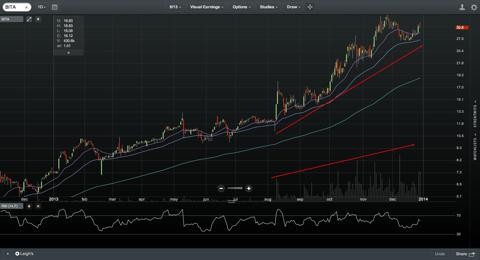One Place Where SoCalled Smart Beta Hasn t Been Very Smart
Post on: 20 Апрель, 2015 No Comment

Never mind what the cute marketing brochures or what nouveau indexers say. The trumped-up allegations that beta is somehow smart or better is a grand ole fairytale.
While smart beta types (formerly referred to as fundamental indexers) are pumping up their equity concoctions (NYSEARCA:PRF), their alternative bond strategies are getting crushed.
The iShares iBoxx Corporate Investment Grade Bond Fund (NYSEARCA:LQD) a bond ETF with an old school market cap weighting approach has gained more than 17% over the past three years while its new school alternative beta competitor the PowerShares Fundamental Investment Grade Bond Fund (NYSEARCA:PFIG) has delivered a subpar 5.38% return. (See chart below) You dont need to be a CFA or Ph.D. to understand that this type of massive underperformance in any market especially the stingy bond market isnt a very smart result.
By the way, this same phenomenon of significant underperformance with new school alternative beta bond ETFs being out-distanced, is also evident in other segments of the bond market.
The SPDR Barclays High Yield Bond ETF (NYSEARCA:JNK), for instance, has gained 22% over the past three years, while its peer rival the PowerShares Fundamental High Yield Bond ETF (NYSEARCA:PHB) has lagged by a disappointing 3%.
Likewise, so-called smart beta investing has failed miserably in international debt markets.
The iShares JPMorgan USD Emerging Markets Bond Fund (NYSEARCA:EMB) has crushed the PowerShares Fundamental Emerging Markets Bond ETF (NYSEARCA:PFEM) by 3.6% over the past year. Outperformance of 3% to 3.5% in the bond market where long-term returns are typically smaller compared to stocks is nothing to sneeze at.
We just examined three distinct segments of the bond market where alternative beta bond ETFs have utterly failed. And as they say; once is an accident, twice is a coincidence, and three times is a trend.
What about the fact that old-school market cap weighted bond indexes assign bigger allocations to the largest issuers of debt? Isnt that problematic? Even with this supposed shortcoming, old-school bond index ETFs are still effortlessly beating newer alternative beta bond ETFs.
Looking ahead to 2015, I sincerely hope more people, including the financial media, will start referring to smart beta investing to what it really is: Strategic or alternative beta investing and nothing more.
Follow us on Twitter @ ETFguide














